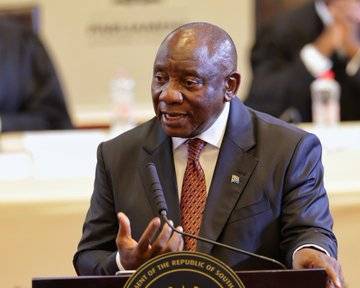
President Cyril Ramaphosa.Photo: @CyrilRamaphosa/X
President Cyril Ramaphosa has expressed concern over the 30% tariff imposed by the US on South African exports, despite a seven-day reprieve from implementation of the measure which had been set to kick in on Friday.
South Africa is among several countries facing punitive tariffs from the US as it moves to protect its own manufacturers and labour force. President Donald Trump announced the tariffs in April but delayed them for 90 days to allow countries to negotiate better deals. In July he confirmed that they would take effect on 1 August. This has now been pushed back seven days.
On Friday, Ramaphosa said his government was finalising a package to support companies that are vulnerable to the reciprocal tariffs, adding that the details would be announced “in due course”.
He said Pretoria had submitted a framework deal to Washington in an effort to strengthen “mutually beneficial trade and investment ties”.
“South Africa and US trade relations are complementary in nature and South African exports do not pose a threat to US industry. Importantly, SA exports to the US contain inputs from the African continent and contribute to intra-Africa trade,” he said.
Ramaphosa said his government would pursue all diplomatic avenues to safeguard the country’s national interests.
“It is important that, as a country, we keep our people at work and our companies producing some of the high-quality products destined for many parts of the world.”
Trump’s administration claims that a lack of reciprocity in trade relations has eroded the US’s manufacturing base, disrupted supply chains and weakened its defence industrial base.
Earlier this week, Department of Trade, Industry and Competition said South Africa does not intend to retaliate against the tariffs.
It has set up an export support desk as part of a diversification strategy “to create resilience” in the economy. The desk is collaborating with export councils, industry associations and major exporters to the US to assist in accessing alternative markets.
“We also want to reiterate that we have no intention of decoupling from the United States either. Our view is that negotiations remain the best tool to deal with the issues that are on the table,” it said.
Pretoria is still waiting for a response from Washington on its proposed framework deal, which includes substantial trade and investment incentives.
These include the import of between 750 and 100 petajoules of liquified natural gas over 10 years, potentially unlocking $12 billion in investment. The deal also proposes simplifying US poultry exports under the 2016 tariff rate quota system, unlocking about $91 million in trade.
Other elements include the import of US blueberries and a commitment by South Africa to invest $3.3 billion in US industries such as mining, metals recycling, critical minerals, pharmaceuticals and agricultural machinery.
The deal includes exemptions from reciprocal tariffs in key sectors, including shipbuilding, counter-seasonal agriculture and exports by micro, small and medium enterprises with annual exports of less than $1 million.
The trade department said it had been in “intense negotiations” with the US and had signed a condition precedent document, with inputs ready for inclusion in a template expected from Washington.
“Despite the challenges that have been presented by this period, we have put our best foot forward, bringing together the subject specialists within our ranks that have dug deep to ensure that our country is adequately prepared for a number of potential scenarios,” it said.
